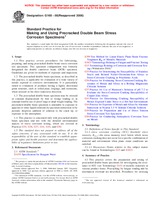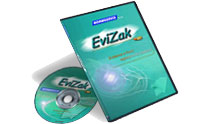Wir benötigen Ihre Einwilligung zur Verwendung der einzelnen Daten, damit Sie unter anderem Informationen zu Ihren Interessen einsehen können. Klicken Sie auf "OK", um Ihre Zustimmung zu erteilen.
ASTM G168-00(2006)
Standard Practice for Making and Using Precracked Double Beam Stress Corrosion Specimens
Automatische name übersetzung:
Standard Praxis zur Herstellung und Verwendung Precracked Double Beam BelastungskorrosionsSpecimens
NORM herausgegeben am 1.11.2006
Informationen über die Norm:
Bezeichnung normen: ASTM G168-00(2006)
Anmerkung: UNGÜLTIG
Ausgabedatum normen: 1.11.2006
SKU: NS-57503
Zahl der Seiten: 10
Gewicht ca.: 30 g (0.07 Pfund)
Land: Amerikanische technische Norm
Kategorie: Technische Normen ASTM
Die Annotation des Normtextes ASTM G168-00(2006) :
Keywords:
crack growth rate, double cantilever beam specimen, KISCC, plateau velocity, precracked double beam specimen, precracked specimens, stress corrosion cracking, threshold stress intensity, ICS Number Code 77.060 (Corrosion of metals)
Ergänzende Informationen
| Significance and Use | ||||||||||||||||||||||
|
Precracked specimens offer the opportunity to use the principles of linear elastic fracture mechanics (1)3 to evaluate resistance to stress corrosion cracking in the presence of a pre-existing crack. This type of evaluation is not included in conventional bent beam, C-ring, U-bend, and tension specimens. The precracked double beam specimen is particularly useful for evaluation of materials that display a strong dependence on grain orientation. Since the specimen dimension in the direction of applied stress is small for the precracked double beam specimen, it can be successfully used to evaluate short transverse stress corrosion cracking of wrought products, such as rolled plate or extrusions. The research applications and analysis of precracked specimens in general, and the precracked double beam specimen in particular, are discussed in Appendix X1. The precracked double beam specimen may be stressed in either constant displacement or constant load. Constant displacement specimens stressed by loading bolts or wedges are compact and self-contained. By comparison, constant load specimens stressed with springs (for example, proof rings, discussed in Test Method G 49, 7.2.1.2) or by deadweight loading require additional fixtures that remain with the specimen during exposure. The recommendations of this practice are based on the results of interlaboratory programs to evaluate precracked specimen test procedures (2,3) as well as considerable industrial experience with the precracked double beam specimen and other precracked specimen geometries (4-8). |
||||||||||||||||||||||
| 1. Scope | ||||||||||||||||||||||
|
1.1 This practice covers procedures for fabricating, preparing, and using precracked double beam stress corrosion test specimens. This specimen configuration was formerly designated the double cantilever beam (DCB) specimen. Guidelines are given for methods of exposure and inspection. 1.2 The precracked double beam specimen, as described in this practice, is applicable for evaluation of a wide variety of metals exposed to corrosive environments. It is particularly suited to evaluation of products having a highly directional grain structure, such as rolled plate, forgings, and extrusions, when stressed in the short transverse direction. 1.3 The precracked double beam specimen may be stressed in constant displacement by bolt or wedge loading or in constant load by use of proof rings or dead weight loading. The precracked double beam specimen is amenable to exposure to aqueous or other liquid solutions by specimen immersion or by periodic dropwise addition of solution to the crack tip, or exposure to the atmosphere. 1.4 This practice is concerned only with precracked double beam specimen and not with the detailed environmental aspects of stress corrosion testing, which are covered in Practices G 35, G 36, G 37, G 41, G 44, and G 50. This standard does not purport to address all of the safety concerns, if any, associated with its use. It is the responsibility of the user of this standard to establish appropriate safety and health practices and determine the applicability of regulatory limitations prior to use. |
||||||||||||||||||||||
| 2. Referenced Documents | ||||||||||||||||||||||
|
Empfehlungen:
EEviZak – alle Gesetze einschließlich ihrer Evidenz in einer Stelle
Bereitstellung von aktuellen Informationen über legislative Vorschriften in der Sammlung der Gesetze bis zum Jahr 1945.
Aktualisierung 2x pro Monat!
Brauchen Sie mehr Informationen? Sehen Sie sich diese Seite an.




 Cookies
Cookies
